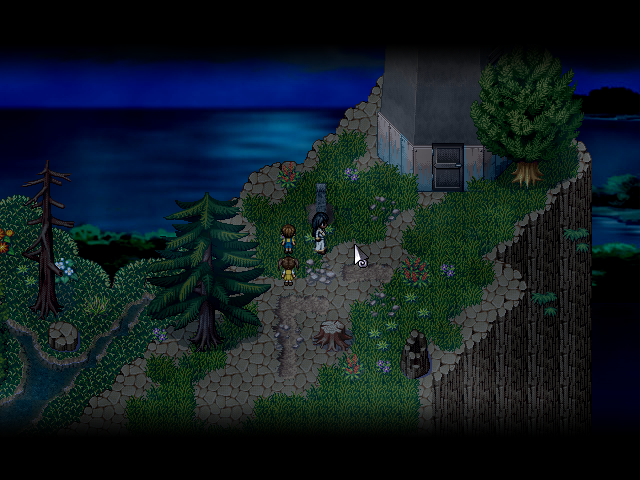Mento's May Madness More: #6 - To The Moon
By Mento 1 Comments
May the Sixth

The game: Freebird Games's To The Moon
The source: Indie Royale's The Fall Bundle
The pre-amble: To The Moon is an adventure game with a nostalgic 16-bit JRPG veneer in which a pair of hi-tech memory-modification engineers help an old man retroactively realize his dream as he lays dying. The current client, a John "Johnny" Wyles, wishes to have memories of visiting the moon, yet he can't seem to recall precisely how and why this dream came about. Both the engineers and the player have a mostly passive role as they observe the man's life through his memories and try to find the root of this dream, and subsequently help him to live it.
The playthrough: To The Moon is simply delightful. I think I may have opened with a similar statement yesterday for Unmechanical too, but while that game had a compelling atmosphere and the barest hint of a narrative, To The Moon is far more story-focused and the appeal is all in the telling of that tale. I can't describe the game in too much detail because it is basically a visual novel, with a few curious touches: Revealing too much about what the characters are doing and where the game ultimately leads would be spoiling something or other, so instead I'll try to talk around the plot points.
The two playable characters are essentially a Greek chorus - that narrative construct where a group of minor characters don't generally interfere with the story but rather commentate on it as a cipher for the audience. If you've ever seen Millennium Actress - a fantastic movie with a very similar theme of exploring a long life filled with memories both cherished and regretful - the two engineers play the roles of the two TV crewmembers. Or, if you'd prefer, Gonzo and Rizzo throughout The Muppet Christmas Carol (turns out I can get pretty highbrow with my movie references, huh). They facilitate the journey through the central character's memories and comment on it, but are merely observers in the grand scheme of things. Much of the game is spent discovering questions and finding answers to them or, as the game takes place in roughly reverse chronological order, finding items of particular sentimental value as gateways to earlier memories and discovering the origin of their importance. I'm making it sound a bit Inception-y, but it's not as complicated as all that.

There were a few facets I didn't appreciate. The first is the humor, as it tends to fluctuate in quality and pops up during times when levity is not always required or requested (I know, glass houses and all that). The other is the game's insistence on some fairly basic Layton-esque tile-flipping mini-games which are necessary to access earlier memories after finding a certain number of nodes around the immediate vicinity - while the gathering of these memory nodes is a useful device to keep players moving and exploring the world for contextual clues, which in part expand the player's greater understanding of the central character and the story, the actual puzzles themselves don't serve a similar narrative-enhancing purpose. They're also quite easy, which only makes them feel even more superfluous - it almost feels like they were a basic form of interaction added by the designer to justify calling To The Moon a video game. I'd prefer not to get into the argument of whether a video game needs game parts in it before it can qualify as such, because I find the whole thing a reductive fallacy. If designers and authors want to keep making interactive creations like To The Moon or The Walking Dead or 999, they shouldn't feel browbeaten into including one or more overtly "video game" elements that like as not (especially with those three examples) don't really improve the overall product in any appreciable way. I guess that topic's outside the scope of this overview though.
Really, To The Moon is a great little story with a few dents and bruises here and there. The visual novel's not a format that appeals too much to Western gamers, possibly because they realize that they'd be better off with a good book, but a hybrid like this might change a few minds in that regard.
The verdict: I've beaten it so I'm done. I'd recommend it to anyone though.


1 Comments